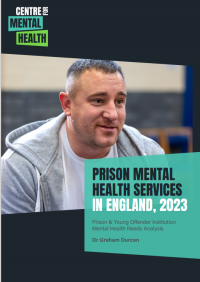Dr Graham Durcan
The vast majority of people who come into custodial settings have vulnerabilities and often complex needs, with nine out of ten prisoners having at least one mental health or substance misuse problem. This report compares current levels of need with prison mental health provision.
Prison mental health services in England, 2023 is based on a survey of three-quarters of prisons and Young Offender Institutions in England, commissioned by NHS England. It finds that more than 7,700 people in the prisons surveyed were receiving support from a mental health service while in custody. This equates to one prisoner in seven getting support from mental health services, which rises to more than one in four among women in custody.
The survey also collected data on types of intervention available, staffing, skills, gaps in need and processes in relation to mental health service provision in prisons. The report finds that some form of talking therapy was the most commonly offered intervention nationally and across four regions. It also finds that most prisons do not employ someone with mental health expertise to carry out screening at reception. This means many people’s needs may be missed when they arrive in prison.
Prison mental health services in England, 2023 calls for prison mental health services to be more consistently staffed, with a range of professionals with expertise across different disciplines. The report recommends that the Government goes ahead with its plan to amend the Mental Health Act so that no one waits more than 28 days for a transfer to hospital. It also calls for more ‘through the gates’ mental health support when people leave prison. This should include support with housing, employment and benefits.





